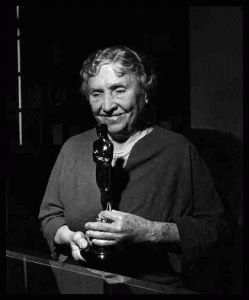Helen Adams Keller was an American writer, activist and teacher, deaf-blind since the age of 19 months. Her story and that of her teacher Anne Sullivan, it is surprising and unique, for will, determination and strength, so as to have inspired several movies (Deliverance, The Unconquered, Anna dei miracoli, The Miracle Worker).
Keller was well-traveled, and was outspoken in her opposition to war. A member of the Socialist Party of America and the Wobblies, she campaigned forwomen’s suffrage, workers’ rights, and socialism, as well as many other leftist causes.
Her mother’s love, that has not yielded in the face of the skepticism that would have onfined Helen to a life of silence and darkness, and the consistency of Anne Sullivan led Helen to learn to communicate, write and speak, able to express her message.
If watching the movies may help to explain how a deafblind person can learn to speak, this video is a testament to the teaching method used by Sullivan. Touch, feel, perceive. The forms, feelings, movements, vibrations, pass through the hands and once encoded the meaning of the information, it is probably very similar to that carried by other languages, including the verbal.
Despite being dead for several decades, her presence is still strong.
The books are on the market, she has also an Official Facebook page, …
The words of Helen Keller convey some of the concepts upon which the idea of Noisyvision is based.
In the book The world I live in (read it here or listen it here) she writes:
The only lightless dark is the night of ignorance and insensibility. We differ, blind and seeing, one from another, not in our senses, but in the use we make of them, in the imagination and courage with which we seek wisdom beyond our senses.
It is more difficult to teach ignorance to think than to teach an intelligent blind man to see the grandeur of Niagara. I have walked with people whose eyes are full of light, but who see nothing in wood, sea, or sky, nothing in city streets, nothing in books
It might seem that the five senses would work intelligently together only when resident in the same body. Yet when two or three are left unaided, they reach out for their complements in another body, and find that they yoke easily with the borrowed team.
The bulk of the world’s knowledge is an imaginary construction. If astronomy had not kept always in advance of the telescope, no one would ever have thought a telescope worth making. What great invention has not existed in the inventor’s mind long before he gave it tangible shape?
A more splendid example of imaginative knowledge is the unity with which philosophers start their study of the world. They can never perceive the world in its entire reality. Yet their imagination, with its magnificent allowance for error, its power of treating uncertainty as negligible, has pointed the way for empirical knowledge.
In their highest creative moments the great poet, the great musician cease to use the crude instruments of sight and hearing. They break away from their sense-moorings, rise on strong, compelling wings of spirit far above our misty hills and darkened valleys into the region of light, music, intellect.
Our blindness changes not a whit the course of inner realities. Of us it is as true as it is of the seeing that the most beautiful world is always entered through the imagination. If you wish to be something that you are not,–something fine, noble, good,–you shut your eyes, and for one dreamy moment you are that which you long to be.


One comment from the community